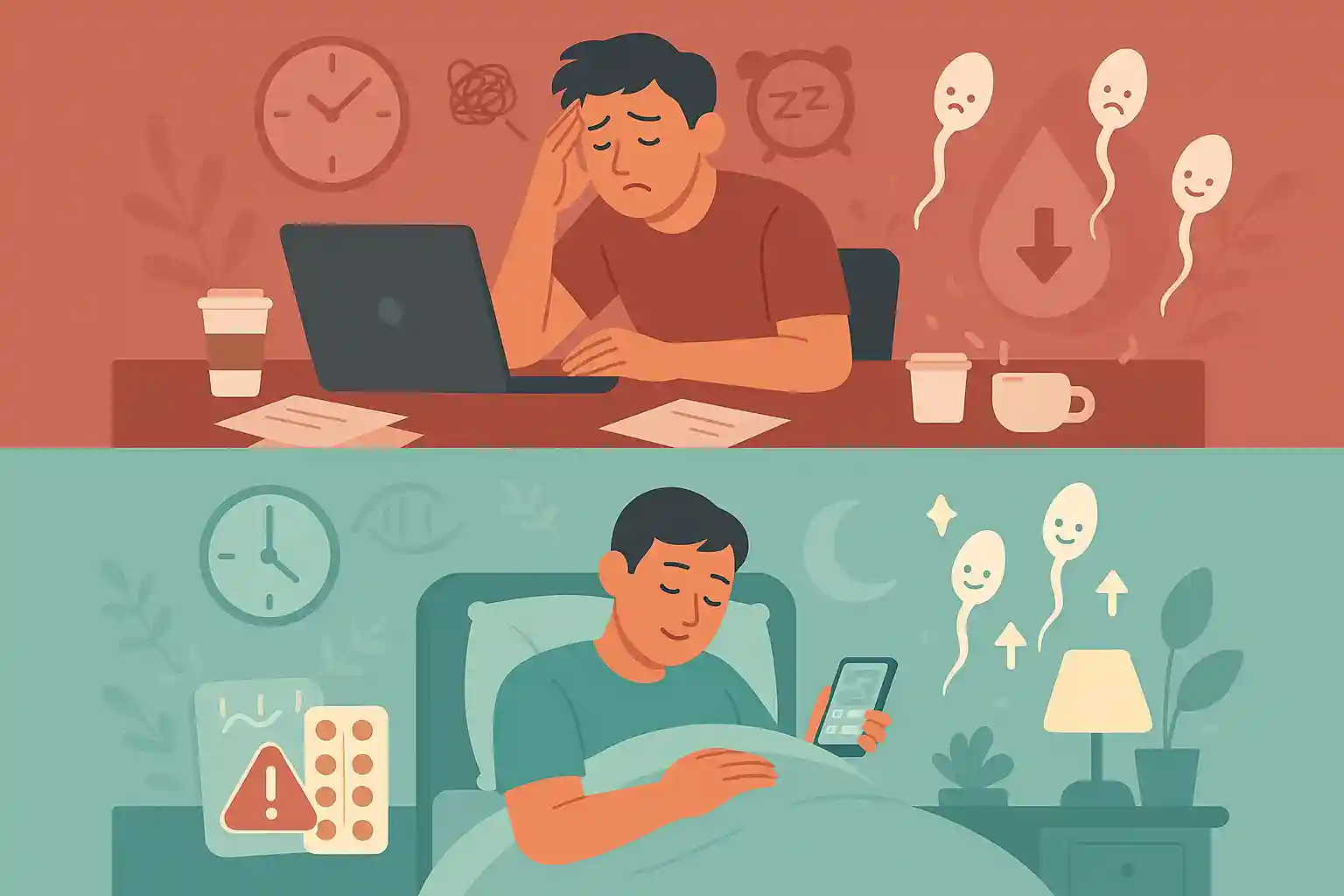In today's fast-paced world, chronic stress and poor sleep have become common lifestyle factors that significantly impact male fertility. While diet and exercise often receive more attention in fertility discussions, the profound effects of stress and sleep on sperm production are equally important. Understanding how these interconnected factors influence sperm count, quality, and overall reproductive health can help men make informed decisions about their fertility journey.
How Stress Affects Sperm Production
Stress triggers a complex cascade of hormonal changes that can dramatically impact sperm production and quality. When faced with stress, the body releases cortisol and other stress hormones that interfere with the delicate balance required for optimal fertility.
The Stress-Fertility Connection:
- Cortisol suppresses testosterone production by inhibiting luteinizing hormone (LH)
- Chronic stress disrupts the hypothalamic-pituitary-gonadal (HPG) axis
- Elevated stress hormones can reduce sperm concentration by up to 38%
- Stress increases oxidative stress, damaging sperm DNA
- Prolonged stress can lead to decreased sperm motility and morphology
Types of Stress That Impact Fertility
Different types of stress can affect sperm production in various ways:
Acute Stress:
- Short-term stress events (exams, work deadlines)
- May temporarily reduce sperm count
- Effects are usually reversible with stress resolution
- Can be managed with proper coping strategies
Chronic Stress:
- Long-term stress (financial problems, relationship issues, work pressure)
- More damaging to sperm production and quality
- Can lead to persistent fertility problems
- Requires comprehensive stress management approaches
Psychological Stress:
- Anxiety, depression, and emotional distress
- Fertility-related stress creates a vicious cycle
- Can significantly impact hormone production
- May require professional mental health support
The Role of Sleep in Male Fertility
Sleep is crucial for reproductive health, serving as the foundation for hormone production and cellular repair. During sleep, the body produces the majority of its testosterone and engages in essential processes for sperm development.
How Sleep Supports Sperm Production:
- Testosterone production peaks during deep sleep phases
- Growth hormone release supports sperm development
- Cellular repair processes restore damaged sperm DNA
- Antioxidant systems are replenished to protect sperm
- Stress hormones are regulated and reduced during quality sleep
Effects of Sleep Deprivation on Fertility
Poor sleep quality and insufficient sleep duration can have severe consequences for male fertility:
Hormonal Disruption:
- Testosterone levels can drop by 10-15% after one week of sleep restriction
- Luteinizing hormone (LH) production becomes irregular
- Cortisol levels remain elevated, suppressing reproductive hormones
- Melatonin production is disrupted, affecting sperm quality
Direct Sperm Impact:
- Reduced sperm concentration and total count
- Decreased sperm motility and progressive movement
- Increased DNA fragmentation in sperm
- Altered sperm morphology and structure
- Reduced overall fertility potential
The Sleep-Stress-Fertility Cycle
Stress and sleep problems often create a destructive cycle that compounds fertility issues:
- Stress disrupts sleep quality and duration
- Poor sleep increases stress hormone production
- Elevated cortisol further impairs sleep patterns
- Sleep deprivation reduces stress resilience
- Fertility concerns add additional stress, perpetuating the cycle
Identifying Signs of Stress-Related Fertility Issues
Recognizing the warning signs can help you address stress and sleep issues before they significantly impact fertility:
Physical Signs:
- Persistent fatigue despite adequate sleep time
- Difficulty falling asleep or staying asleep
- Reduced libido or sexual dysfunction
- Frequent illness or slow recovery
- Muscle tension, headaches, or digestive issues
Emotional and Behavioral Signs:
- Irritability, anxiety, or mood swings
- Difficulty concentrating or making decisions
- Increased reliance on caffeine, alcohol, or other substances
- Social withdrawal or relationship problems
- Decreased motivation or enjoyment in activities
Stress Management Strategies for Better Fertility
Effective stress management can significantly improve sperm production and overall fertility:
Mind-Body Techniques:
- Regular meditation or mindfulness practice (10-20 minutes daily)
- Deep breathing exercises during stressful moments
- Progressive muscle relaxation techniques
- Yoga or tai chi for combined physical and mental benefits
- Journaling to process emotions and identify stress triggers
Lifestyle Modifications:
- Regular exercise (moderate intensity, 30 minutes most days)
- Maintain social connections and support networks
- Set realistic goals and expectations
- Practice time management and prioritization
- Engage in hobbies and activities that bring joy
Professional Support:
- Counseling or therapy for persistent stress or anxiety
- Couples counseling for relationship-related stress
- Support groups for men dealing with fertility challenges
- Stress management workshops or classes
- Consider professional help if stress feels overwhelming
Optimizing Sleep for Fertility
Creating healthy sleep habits is essential for maintaining optimal sperm production:
Sleep Hygiene Basics:
- Maintain consistent sleep and wake times (even on weekends)
- Aim for 7-9 hours of quality sleep per night
- Create a cool, dark, and quiet sleep environment
- Invest in comfortable bedding and pillows
- Keep electronic devices out of the bedroom
Pre-Sleep Routine:
- Establish a relaxing 30-60 minute wind-down routine
- Avoid screens 1-2 hours before bedtime
- Try reading, gentle stretching, or meditation
- Take a warm bath or shower to lower body temperature
- Practice gratitude or positive visualization
Daytime Habits for Better Sleep:
- Get natural sunlight exposure in the morning
- Limit caffeine intake after 2 PM
- Avoid large meals, alcohol, and nicotine before bedtime
- Exercise regularly, but not within 3 hours of sleep
- Manage stress throughout the day to prevent nighttime anxiety
The Timeline for Improvement
Understanding when to expect improvements can help maintain motivation:
- Sleep quality improvements: 1-2 weeks of consistent sleep hygiene
- Hormone level changes: 2-4 weeks of better sleep and stress management
- Sperm parameter improvements: 2-3 months (full sperm development cycle)
- Overall fertility enhancement: 3-6 months of sustained lifestyle changes
- Consistency is key - intermittent improvements won't be as effective
When to Seek Professional Help
Consider professional intervention if you experience:
- Persistent insomnia lasting more than 3 weeks
- Chronic stress that interferes with daily functioning
- Signs of depression or anxiety disorders
- Sleep disorders like sleep apnea or restless leg syndrome
- Significant relationship problems due to fertility stress
- Lack of improvement despite consistent self-help efforts
Creating a Comprehensive Approach
The most effective strategy combines multiple approaches for maximum benefit:
Daily Routine Integration:
- Morning sunlight exposure and brief meditation
- Regular meal times to support circadian rhythms
- Scheduled stress-relief activities during the day
- Evening wind-down routine starting 1-2 hours before bed
- Weekend consistency to maintain sleep schedule
Partner Support:
- Share stress management goals with your partner
- Create a supportive sleep environment together
- Practice relaxation techniques as a couple
- Communicate openly about fertility-related stress
- Seek couples support when needed
The Bottom Line
Stress and sleep play crucial roles in male fertility that are often underestimated. Chronic stress and poor sleep quality can significantly reduce sperm count, motility, and overall fertility potential. However, the good news is that both factors are largely within your control.
By implementing effective stress management techniques and prioritizing sleep hygiene, men can see substantial improvements in their reproductive health. Remember that sperm development takes approximately 74 days, so consistency and patience are essential for seeing results.
The investment in better stress management and sleep quality pays dividends not only for fertility but for overall health and well-being. Start with small, manageable changes and gradually build a comprehensive approach that works for your lifestyle. Your future self—and your fertility—will thank you for prioritizing these fundamental aspects of health.



